中英礼仪文化禁忌比较与跨文化交际
- 格式:doc
- 大小:161.00 KB
- 文档页数:19
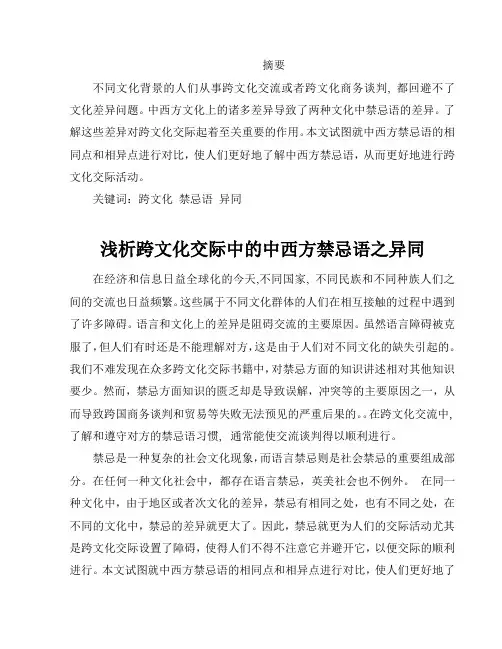
摘要不同文化背景的人们从事跨文化交流或者跨文化商务谈判, 都回避不了文化差异问题。
中西方文化上的诸多差异导致了两种文化中禁忌语的差异。
了解这些差异对跨文化交际起着至关重要的作用。
本文试图就中西方禁忌语的相同点和相异点进行对比,使人们更好地了解中西方禁忌语,从而更好地进行跨文化交际活动。
关键词:跨文化禁忌语异同浅析跨文化交际中的中西方禁忌语之异同在经济和信息日益全球化的今天,不同国家, 不同民族和不同种族人们之间的交流也日益频繁。
这些属于不同文化群体的人们在相互接触的过程中遇到了许多障碍。
语言和文化上的差异是阻碍交流的主要原因。
虽然语言障碍被克服了,但人们有时还是不能理解对方,这是由于人们对不同文化的缺失引起的。
我们不难发现在众多跨文化交际书籍中,对禁忌方面的知识讲述相对其他知识要少。
然而,禁忌方面知识的匮乏却是导致误解,冲突等的主要原因之一,从而导致跨国商务谈判和贸易等失败无法预见的严重后果的。
在跨文化交流中, 了解和遵守对方的禁忌语习惯, 通常能使交流谈判得以顺利进行。
禁忌是一种复杂的社会文化现象,而语言禁忌则是社会禁忌的重要组成部分。
在任何一种文化社会中,都存在语言禁忌,英美社会也不例外。
在同一种文化中,由于地区或者次文化的差异,禁忌有相同之处,也有不同之处,在不同的文化中,禁忌的差异就更大了。
因此,禁忌就更为人们的交际活动尤其是跨文化交际设置了障碍,使得人们不得不注意它并避开它,以便交际的顺利进行。
本文试图就中西方禁忌语的相同点和相异点进行对比,使人们更好地了解中西方禁忌语,从而更好地进行跨文化交际。
一.中西禁忌语的相似之处1.1.对敏感词的禁忌无论是东方文化还是西方文化,都对“死”怀有强烈的恐惧, 极不愿意提及“死”字。
汉文化里“死”是人们最忌讳的字眼,人们忌讳谈死,在语言交际中总是回避“死”,尽量用其他词语代替。
据《汉语委婉语词典》记载,汉语中表示死亡的委婉语有481 条之多,英语中类似“死”的委婉语也有400 余条。
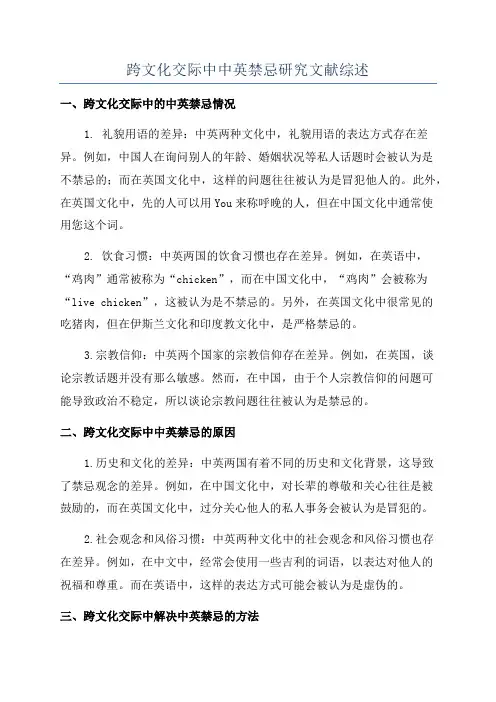
跨文化交际中中英禁忌研究文献综述一、跨文化交际中的中英禁忌情况1. 礼貌用语的差异:中英两种文化中,礼貌用语的表达方式存在差异。
例如,中国人在询问别人的年龄、婚姻状况等私人话题时会被认为是不禁忌的;而在英国文化中,这样的问题往往被认为是冒犯他人的。
此外,在英国文化中,先的人可以用You来称呼晚的人,但在中国文化中通常使用您这个词。
2. 饮食习惯:中英两国的饮食习惯也存在差异。
例如,在英语中,“鸡肉”通常被称为“chicken”,而在中国文化中,“鸡肉”会被称为“live chicken”,这被认为是不禁忌的。
另外,在英国文化中很常见的吃猪肉,但在伊斯兰文化和印度教文化中,是严格禁忌的。
3.宗教信仰:中英两个国家的宗教信仰存在差异。
例如,在英国,谈论宗教话题并没有那么敏感。
然而,在中国,由于个人宗教信仰的问题可能导致政治不稳定,所以谈论宗教问题往往被认为是禁忌的。
二、跨文化交际中中英禁忌的原因1.历史和文化的差异:中英两国有着不同的历史和文化背景,这导致了禁忌观念的差异。
例如,在中国文化中,对长辈的尊敬和关心往往是被鼓励的,而在英国文化中,过分关心他人的私人事务会被认为是冒犯的。
2.社会观念和风俗习惯:中英两种文化中的社会观念和风俗习惯也存在差异。
例如,在中文中,经常会使用一些吉利的词语,以表达对他人的祝福和尊重。
而在英语中,这样的表达方式可能会被认为是虚伪的。
三、跨文化交际中解决中英禁忌的方法1.尊重和理解:在跨文化交际中,尊重和理解是最重要的。
了解对方的文化背景,尽量避免触碰对方的敏感点,展示对对方文化的尊重。
2.学习和批判性思考:不断学习不同文化之间的禁忌和差异,不只是表面地接受和遵循其中一种文化规范,还要批判性地思考,并意识到不同文化之间的禁忌是可以变化的。
3.沟通和妥协:在进行跨文化交际时,沟通是至关重要的。
学会解释自己的意图,避免产生不必要的误解。
同时,也要学会妥协,尽量迁就对方的文化规范。
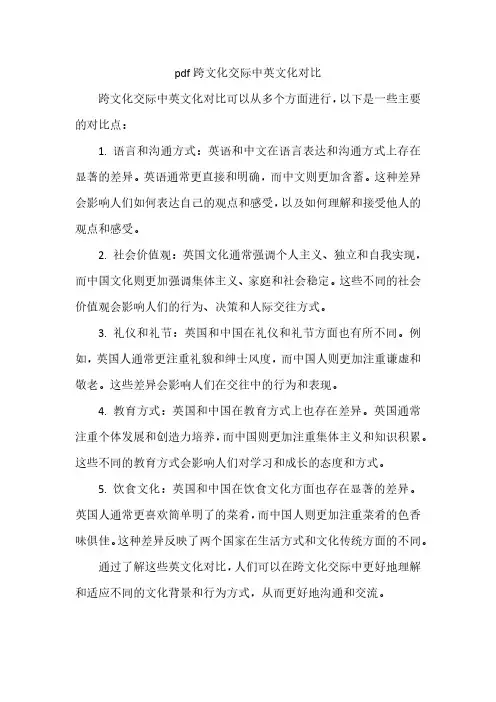
pdf跨文化交际中英文化对比
跨文化交际中英文化对比可以从多个方面进行,以下是一些主要的对比点:
1.语言和沟通方式:英语和中文在语言表达和沟通方式上存在显著的差异。
英语通常更直接和明确,而中文则更加含蓄。
这种差异会影响人们如何表达自己的观点和感受,以及如何理解和接受他人的观点和感受。
2.社会价值观:英国文化通常强调个人主义、独立和自我实现,而中国文化则更加强调集体主义、家庭和社会稳定。
这些不同的社会价值观会影响人们的行为、决策和人际交往方式。
3.礼仪和礼节:英国和中国在礼仪和礼节方面也有所不同。
例如,英国人通常更注重礼貌和绅士风度,而中国人则更加注重谦虚和敬老。
这些差异会影响人们在交往中的行为和表现。
4.教育方式:英国和中国在教育方式上也存在差异。
英国通常注重个体发展和创造力培养,而中国则更加注重集体主义和知识积累。
这些不同的教育方式会影响人们对学习和成长的态度和方式。
5.饮食文化:英国和中国在饮食文化方面也存在显著的差异。
英国人通常更喜欢简单明了的菜肴,而中国人则更加注重菜肴的色香味俱佳。
这种差异反映了两个国家在生活方式和文化传统方面的不同。
通过了解这些英文化对比,人们可以在跨文化交际中更好地理解和适应不同的文化背景和行为方式,从而更好地沟通和交流。
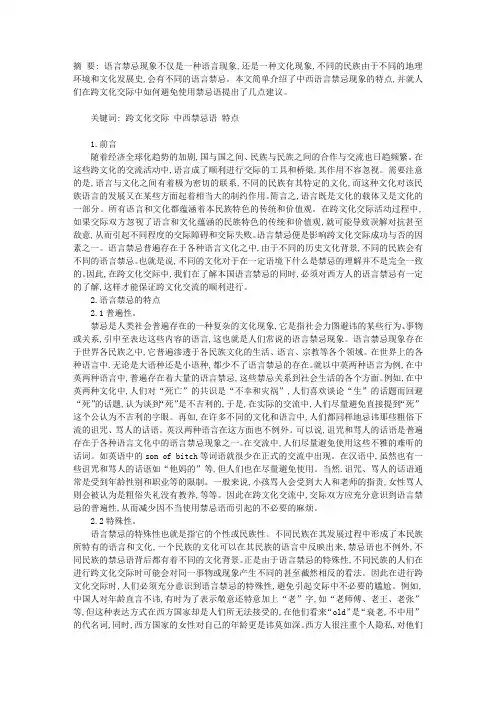
摘要: 语言禁忌现象不仅是一种语言现象,还是一种文化现象,不同的民族由于不同的地理环境和文化发展史,会有不同的语言禁忌。
本文简单介绍了中西语言禁忌现象的特点,并就人们在跨文化交际中如何避免使用禁忌语提出了几点建议。
关键词: 跨文化交际中西禁忌语特点1.前言随着经济全球化趋势的加剧,国与国之间、民族与民族之间的合作与交流也日趋频繁。
在这些跨文化的交流活动中,语言成了顺利进行交际的工具和桥梁,其作用不容忽视。
需要注意的是,语言与文化之间有着极为密切的联系,不同的民族有其特定的文化,而这种文化对该民族语言的发展又在某些方面起着相当大的制约作用。
简言之,语言既是文化的载体又是文化的一部分。
所有语言和文化都蕴涵着本民族特色的传统和价值观。
在跨文化交际活动过程中,如果交际双方忽视了语言和文化蕴涵的民族特色的传统和价值观,就可能导致误解对抗甚至敌意,从而引起不同程度的交际障碍和交际失败。
语言禁忌便是影响跨文化交际成功与否的因素之一。
语言禁忌普遍存在于各种语言文化之中,由于不同的历史文化背景,不同的民族会有不同的语言禁忌。
也就是说,不同的文化对于在一定语境下什么是禁忌的理解并不是完全一致的。
因此,在跨文化交际中,我们在了解本国语言禁忌的同时,必须对西方人的语言禁忌有一定的了解,这样才能保证跨文化交流的顺利进行。
2.语言禁忌的特点2.1普遍性。
禁忌是人类社会普遍存在的一种复杂的文化现象,它是指社会力图避讳的某些行为、事物或关系,引申至表达这些内容的语言,这也就是人们常说的语言禁忌现象。
语言禁忌现象存在于世界各民族之中,它普遍渗透于各民族文化的生活、语言、宗教等各个领域。
在世界上的各种语言中,无论是大语种还是小语种,都少不了语言禁忌的存在。
就以中英两种语言为例,在中英两种语言中,普遍存在着大量的语言禁忌,这些禁忌关系到社会生活的各个方面。
例如,在中英两种文化中,人们对“死亡”的共识是“不幸和灾祸”,人们喜欢谈论“生”的话题而回避“死”的话题,认为谈到“死”是不吉利的,于是,在实际的交流中,人们尽量避免直接提到“死”这个公认为不吉利的字眼。
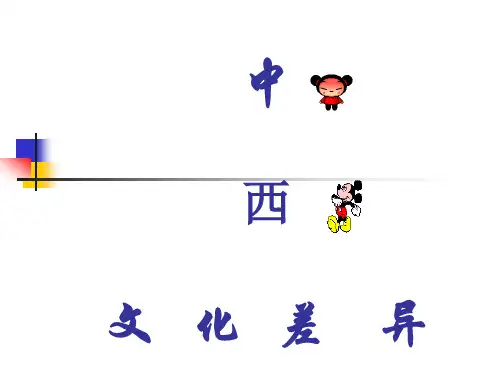
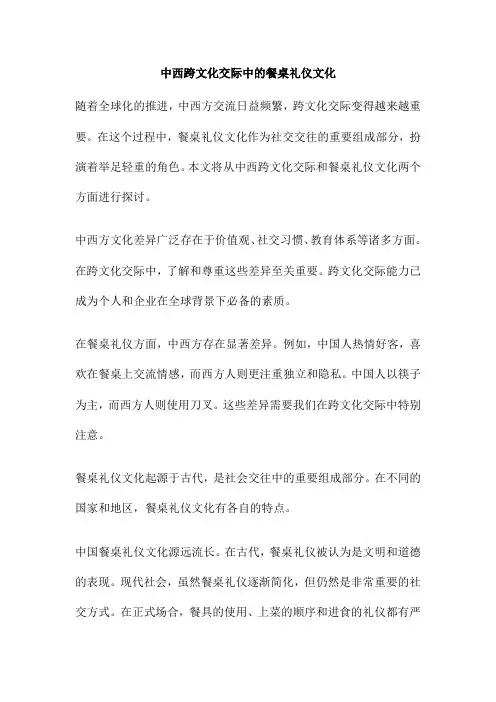
中西跨文化交际中的餐桌礼仪文化随着全球化的推进,中西方交流日益频繁,跨文化交际变得越来越重要。
在这个过程中,餐桌礼仪文化作为社交交往的重要组成部分,扮演着举足轻重的角色。
本文将从中西跨文化交际和餐桌礼仪文化两个方面进行探讨。
中西方文化差异广泛存在于价值观、社交习惯、教育体系等诸多方面。
在跨文化交际中,了解和尊重这些差异至关重要。
跨文化交际能力已成为个人和企业在全球背景下必备的素质。
在餐桌礼仪方面,中西方存在显著差异。
例如,中国人热情好客,喜欢在餐桌上交流情感,而西方人则更注重独立和隐私。
中国人以筷子为主,而西方人则使用刀叉。
这些差异需要我们在跨文化交际中特别注意。
餐桌礼仪文化起源于古代,是社会交往中的重要组成部分。
在不同的国家和地区,餐桌礼仪文化有各自的特点。
中国餐桌礼仪文化源远流长。
在古代,餐桌礼仪被认为是文明和道德的表现。
现代社会,虽然餐桌礼仪逐渐简化,但仍然是非常重要的社交方式。
在正式场合,餐具的使用、上菜的顺序和进食的礼仪都有严格的要求。
相比之下,西方餐桌礼仪文化则更注重实用和舒适。
餐具的使用相对简单,食物的摆放和进食顺序也更为灵活。
然而,在商务场合,西方人仍非常注重餐桌礼仪,以展现尊重和专业的形象。
在跨文化交际中,了解并尊重对方的文化非常重要。
以下是几个建议,帮助你在餐桌礼仪方面更好地遵循跨文化交际原则:提前了解:在参加跨文化交际活动前,尽可能了解对方的文化和餐桌礼仪习惯。
可以通过书籍、网络或专业指导获取相关信息。
主动学习:在交际过程中,主动向对方学习,询问有关餐桌礼仪的问题。
这不仅有助于避免尴尬局面,还能增加双方之间的信任和友谊。
注意细节:对方的餐桌礼仪细节,如使用餐具、进食顺序等。
遵循对方的礼仪规范,让对方感受到你的尊重和理解。
适度适应:在遵循对方餐桌礼仪的基础上,可适当地融入自己的文化元素。
这将使交流更加轻松愉快,同时也能体现个人的素养和灵活性。
共同探讨:在餐桌礼仪方面,可以与对方共同探讨和分享经验。
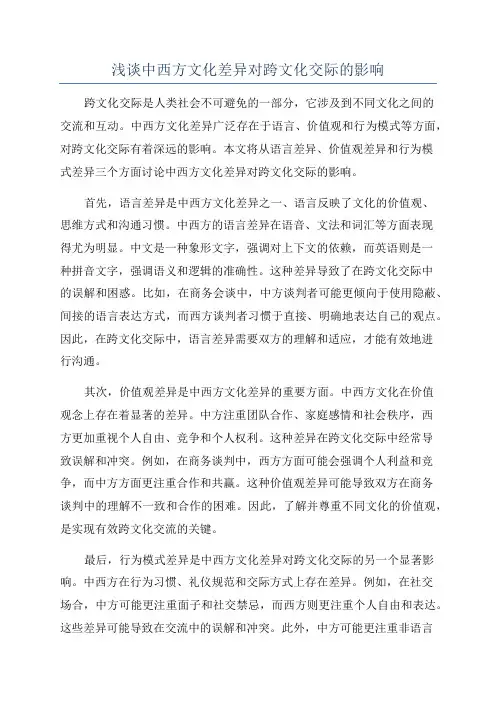
浅谈中西方文化差异对跨文化交际的影响跨文化交际是人类社会不可避免的一部分,它涉及到不同文化之间的交流和互动。
中西方文化差异广泛存在于语言、价值观和行为模式等方面,对跨文化交际有着深远的影响。
本文将从语言差异、价值观差异和行为模式差异三个方面讨论中西方文化差异对跨文化交际的影响。
首先,语言差异是中西方文化差异之一、语言反映了文化的价值观、思维方式和沟通习惯。
中西方的语言差异在语音、文法和词汇等方面表现得尤为明显。
中文是一种象形文字,强调对上下文的依赖,而英语则是一种拼音文字,强调语义和逻辑的准确性。
这种差异导致了在跨文化交际中的误解和困惑。
比如,在商务会谈中,中方谈判者可能更倾向于使用隐蔽、间接的语言表达方式,而西方谈判者习惯于直接、明确地表达自己的观点。
因此,在跨文化交际中,语言差异需要双方的理解和适应,才能有效地进行沟通。
其次,价值观差异是中西方文化差异的重要方面。
中西方文化在价值观念上存在着显著的差异。
中方注重团队合作、家庭感情和社会秩序,西方更加重视个人自由、竞争和个人权利。
这种差异在跨文化交际中经常导致误解和冲突。
例如,在商务谈判中,西方方面可能会强调个人利益和竞争,而中方方面更注重合作和共赢。
这种价值观差异可能导致双方在商务谈判中的理解不一致和合作的困难。
因此,了解并尊重不同文化的价值观,是实现有效跨文化交流的关键。
最后,行为模式差异是中西方文化差异对跨文化交际的另一个显著影响。
中西方在行为习惯、礼仪规范和交际方式上存在差异。
例如,在社交场合,中方可能更注重面子和社交禁忌,而西方则更注重个人自由和表达。
这些差异可能导致在交流中的误解和冲突。
此外,中方可能更注重非语言交流,比如面部表情、身体语言和姿态,而西方则更注重语言表达。
这种行为模式差异需要双方的互相理解和适应,才能促进有效的跨文化交流。
总结起来,中西方文化差异对跨文化交际产生了重要的影响。
语言差异、价值观差异和行为模式差异是中西方文化差异的主要方面,它们在跨文化交际中经常导致误解、冲突和困惑。
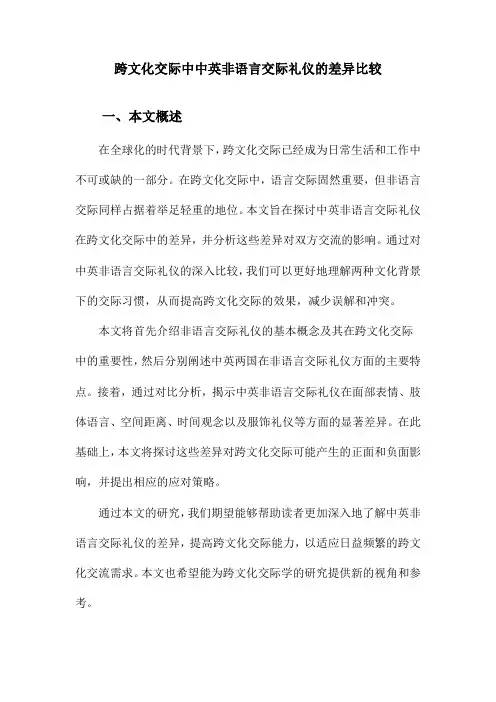
跨文化交际中中英非语言交际礼仪的差异比较一、本文概述在全球化的时代背景下,跨文化交际已经成为日常生活和工作中不可或缺的一部分。
在跨文化交际中,语言交际固然重要,但非语言交际同样占据着举足轻重的地位。
本文旨在探讨中英非语言交际礼仪在跨文化交际中的差异,并分析这些差异对双方交流的影响。
通过对中英非语言交际礼仪的深入比较,我们可以更好地理解两种文化背景下的交际习惯,从而提高跨文化交际的效果,减少误解和冲突。
本文将首先介绍非语言交际礼仪的基本概念及其在跨文化交际中的重要性,然后分别阐述中英两国在非语言交际礼仪方面的主要特点。
接着,通过对比分析,揭示中英非语言交际礼仪在面部表情、肢体语言、空间距离、时间观念以及服饰礼仪等方面的显著差异。
在此基础上,本文将探讨这些差异对跨文化交际可能产生的正面和负面影响,并提出相应的应对策略。
通过本文的研究,我们期望能够帮助读者更加深入地了解中英非语言交际礼仪的差异,提高跨文化交际能力,以适应日益频繁的跨文化交流需求。
本文也希望能为跨文化交际学的研究提供新的视角和参考。
二、非语言交际概述非语言交际是指通过语言之外的各种符号和方式来传达信息、情感、态度和关系的过程。
在跨文化交际中,非语言交际扮演着至关重要的角色,有时甚至超越了语言本身的重要性。
非语言交际包括面部表情、肢体语言、空间距离、触摸行为、时间观念、服饰打扮等诸多方面。
这些元素在不同的文化中有着不同的含义和解读,因此,了解和掌握中英非语言交际礼仪的差异,对于促进两国人民的友好交往和有效沟通具有重要意义。
在中国文化中,非语言交际往往承载着丰富的文化内涵和社会价值观。
例如,面部表情和肢体语言在表达情感、态度和尊重方面扮演着重要角色。
在交流过程中,中国人倾向于保持适度的空间距离,避免过于亲密或疏远的举动。
同时,中国人重视礼貌和谦逊,常常通过点头或微笑来表示认同和尊重。
相比之下,英国文化中的非语言交际方式则有其独特之处。
英国人注重个人空间和隐私,因此在交流时更倾向于保持一定的距离。
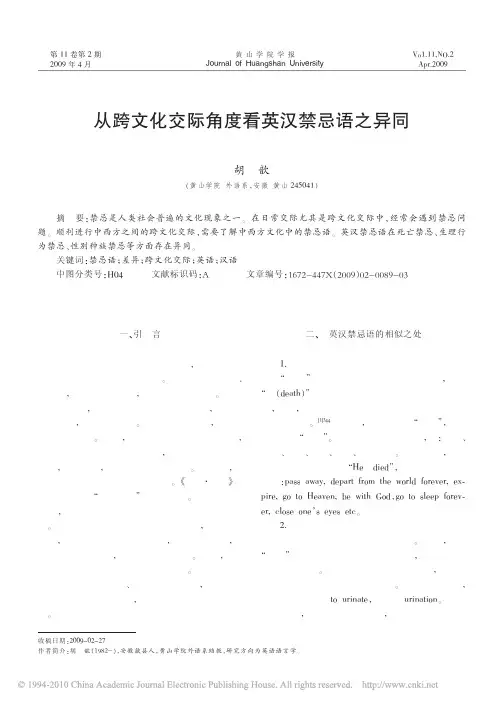
第2期第11卷第2期2009年4月黄山学院学报Journal of Huangshan UniversityVo1.11,NO.2Apr.2009一、引言禁忌是一种复杂的社会文化现象,而语言禁忌则是社会禁忌的重要组成部分。
在任何一种文化、社会中,都存在语言禁忌,英美社会也不例外。
在同一种文化中,由于地区或者次文化的差异,禁忌有相同之处,也有不同之处。
在不同的文化中,禁忌的差异就更大了。
因此,禁忌就更为人们的交际活动,尤其是跨文化交际设置了障碍,使得人们不得不注意它,并避开它,以便交际的顺利进行。
实际上,中国人自古代就十分注意这个问题。
《礼记·曲礼》上就明确记载着“入境问禁”的礼仪规范。
随着历史的演进,人们甚至把某些重要禁忌写成条例公布于众。
英语国家的人们同样十分重视禁忌,在日常交际中,如果有人触犯当地的禁忌,轻者表示不快,重者可能翻脸不认人,甚至被该社会排斥。
因此,了解中西禁忌有助于国际交际的顺利进行。
本文试图就英汉禁忌语的相同点、相异点进行对比,使读者更好地了解中西方禁忌语,从而更好地进行跨文化交际。
二、英汉禁忌语的相似之处1.死亡“死亡”是语言禁忌最主要的领域之一,因为“死(death )”是一种不可抗拒的生理现象和社会现象,因此,人们在死亡面前会感到一种不可解释的超人的力量。
[1]344汉语中,皇帝的死叫“驾崩”,有身份的人叫“仙逝”。
一般的委婉语也很多,如:逝世、病故、寿终、作古、牺牲、辞世等等。
英语亦然,西方人不会直截了当地说“Hedied ”,而用以下说法来代替:pass away,depart from the world forever,ex -pire,go to Heaven,be with God ,go to sleep forev -er,close one ’s eyes etc 。
2.排泄和排泄行为英语和汉语中有些忌讳是一致的。
例如,有关“排泄”的表达成为交际中的主要禁忌,尤其是在讲究礼貌的场合。
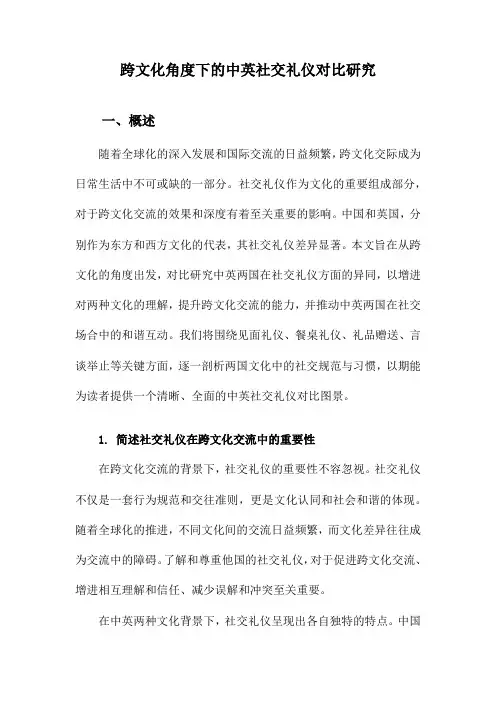
跨文化角度下的中英社交礼仪对比研究一、概述随着全球化的深入发展和国际交流的日益频繁,跨文化交际成为日常生活中不可或缺的一部分。
社交礼仪作为文化的重要组成部分,对于跨文化交流的效果和深度有着至关重要的影响。
中国和英国,分别作为东方和西方文化的代表,其社交礼仪差异显著。
本文旨在从跨文化的角度出发,对比研究中英两国在社交礼仪方面的异同,以增进对两种文化的理解,提升跨文化交流的能力,并推动中英两国在社交场合中的和谐互动。
我们将围绕见面礼仪、餐桌礼仪、礼品赠送、言谈举止等关键方面,逐一剖析两国文化中的社交规范与习惯,以期能为读者提供一个清晰、全面的中英社交礼仪对比图景。
1. 简述社交礼仪在跨文化交流中的重要性在跨文化交流的背景下,社交礼仪的重要性不容忽视。
社交礼仪不仅是一套行为规范和交往准则,更是文化认同和社会和谐的体现。
随着全球化的推进,不同文化间的交流日益频繁,而文化差异往往成为交流中的障碍。
了解和尊重他国的社交礼仪,对于促进跨文化交流、增进相互理解和信任、减少误解和冲突至关重要。
在中英两种文化背景下,社交礼仪呈现出各自独特的特点。
中国文化注重礼貌、谦逊和尊重长辈,而英国文化则更强调礼貌、绅士风度和个人隐私。
这些差异不仅反映了不同文化背景下人们的行为习惯和价值观,也影响着人们在跨文化交流中的表现。
对中英社交礼仪进行对比研究,有助于我们更深入地了解两种文化的异同,提高跨文化交流的能力。
通过比较中英社交礼仪中的具体行为、语言表达和习俗规范,我们可以发现不同文化间的共同点和差异,从而更好地适应不同文化环境,促进跨文化交流的发展。
社交礼仪在跨文化交流中扮演着举足轻重的角色。
通过对比研究中英社交礼仪,我们可以增进对不同文化的理解和尊重,促进跨文化交流的顺利进行,为实现世界和平与发展贡献力量。
2. 提出研究中英社交礼仪对比的目的与意义随着全球化的深入发展,国际交流与合作日益频繁,不同文化背景下的社交礼仪成为影响跨文化交流成功与否的重要因素。
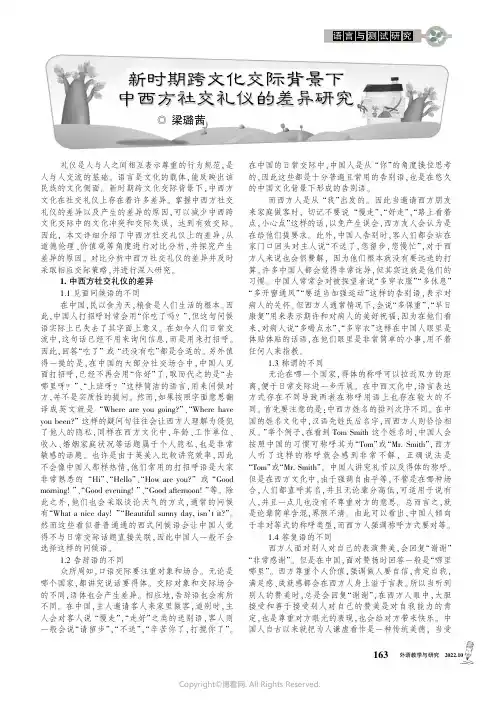
新时期跨文化交际背景下中西方社交礼仪的差异研究◎梁璐茜礼仪是人与人之间相互表示尊重的行为规范,是人与人交流的基础。
语言是文化的载体,能反映出该民族的文化侧面。
新时期跨文化交际背景下,中西方文化在社交礼仪上存在着许多差异。
掌握中西方社交礼仪的差异以及产生的差异的原因,可以减少中西跨文化交际中的文化冲突和交际失误,达到有效交际。
因此,本文详细介绍了中西方社交礼仪上的差异,从道德伦理、价值观等角度进行对比分析,并探究产生差异的原因。
对比分析中西方社交礼仪的差异并及时采取相应交际策略,并进行深入研究。
1.中西方社交礼仪的差异1.1见面问候语的不同在中国,民以食为天,粮食是人们生活的根本。
因此,中国人打招呼时常会用“你吃了吗?”,但这句问候语实际上已失去了其字面上意义。
在如今人们日常交流中,这句话已经不用来询问信息,而是用来打招呼。
因此,回答“吃了”或“还没有吃”都是合适的。
另外值得一提的是,在中国的大部分社交场合中,中国人见面打招呼,已经不再会用“你好”了,取而代之的是“去哪里呀?”、“上班呀?”这样简洁的语言,用来问候对方,并不是实质性的提问。
然而,如果按照字面意思翻译成英文就是“Where are you going?”、“Where have you been?”这样的疑问句往往会让西方人理解为侵犯了他人的隐私,同样在西方文化中,年龄、工作单位、收入、婚姻家庭状况等话题属于个人隐私,也是非常敏感的话题。
也许是由于英美人比较讲究效率,因此不会像中国人那样热情,他们常用的打招呼语是大家非常熟悉的“Hi”、“Hello”、“How are you?”或“Good morning!”、“Good evening!”、“Good afternoon!”等。
除此之外,他们也会采取谈论天气的方式,通常的问候有“What a nice day!”“Beautiful sunny day,isn’t it?”。
然而这些看似普普通通的西式问候语会让中国人觉得不与日常交际话题直接关联,因此中国人一般不会选择这样的问候语。
浅谈跨文化交际中的中西社交礼仪差异摘要:在跨文化交际日益盛行的的今天,由于中西方在社交礼仪上存在差异,中西方人士在社会交往活动中常常发生误会和冲突.因此,了解中西方社交礼仪的差异变得十分必要。
本文详细介绍了中西社交礼仪在诸多方面的差异,并对产生差异的原因进行探究,本文主要从中西方文化的差异、思维方式的不同、价值观的不同等方面进行分析.了解中西方社交礼仪的差异以及产生的差异的原因,有利于减少中西跨文化交际中社交礼仪冲突的发生。
关键字:跨文化交际;社交礼仪;差异Abstract: With intercultural communication becoming more and more popular today,misunderstandings and conflict often occur among Chinese people and foreigners in social activities owing to differences of social etiquettes。
As a consequence, knowing more about the differences becomes quite necessary. Besides, the writer analyses the causes mainly from aspects as differences of cultures,modes of think,values, and so on。
Knowing the differences of social etiquettes between china and the western country and causes,do good to reduce the conflict in intercultural communication。
Key words: Inter—cultural communication; Social Etiquettes; Difference随着中国改革开放的进一步深入,特别是在中国加入WTO以后,中西方人民的沟通愈加紧密,跨文化交际日益繁荣.由于中西方的历史与文化的不同,各国人民在进行礼尚交往时的习惯也有不少差异,尤其,礼仪上的差别很大.因为不了解这些差异而引起的误会和冲突并不少见。
餐桌礼仪对跨文化交际的影响(中西方餐桌礼仪文化差异的意义是什么)文章目录[+]中国和西方在餐桌上的要求存在很大差异,并各有特色,体现了不同的餐桌礼仪。
(一)饮食文化的差异中国一直以来就是礼仪之邦,对于饮食也有自己独到的见解。
孔子在《礼记》里讲“饮食男女,人之大欲存焉。
”孔子对于人生的看法:凡是人的生命,不离两件大事:饮食、男女。
因此中国人对饮食十分重视。
在宴请宾客时,中国主人通常予以非常高的重视,餐桌上的菜品一般都是非常精致珍贵的,而且讲究荤素搭配,色彩搭配,在身份地位或者文化水平比较高的家庭,甚至连菜的取名也有特殊的含义。
而西方国家则更珍惜时间,做事以效率为原则,所以快餐店大行其道。
就算是宴请宾客,主人的准备野与中国有着很大的区别。
主菜很可能就是几道数量不多但是比较珍贵的蔬菜。
(二)餐桌用语差异在请客人用餐时也有很大的差异,在中国,即使餐桌上的菜琳琅满目,主人也会说“菜很少,招待不周,还请大家多担待“;而西方国家的主人则会很随便的说“help yo urself to some vegetables”,显得很自然随意。
同时中国的主人会不时往客人的碗里添布新菜,经常客人的碗被主人夹的菜装得满满的,但是在西方这是非常不礼貌的行为,主人的布菜会让客人觉得自己的意愿没有受到尊重。
餐桌上的气氛中西方也是完全不同的,中国人讲究热闹,所以经常在餐桌上高声谈话,其气氛虽说是其乐融融十分和谐,但在西方人看来却是十分没有教养的表现。
西方的餐桌礼仪讲究礼仪和素养,整个就餐过程应该是十分安静的,举止也十分优雅。
(三)座位排序不同中西方都对宴请活动过程中的座位排序极为重视,中国人在传统的思想中,对八仙桌极为喜爱。
在宴请中,年纪大的长者或是主人,以及德高望重的人坐到主要位置,其他客人会按顺序入座;而西方国家在宴请客人中,习惯用长桌,主人会坐在桌子的两端,而客人则按照次序入座,这种差异反映了中西方思想方面的差异,中国人喜欢幸福圆满的感觉,所以选择圆形的桌子。
跨文化交际视角下中西方商务礼仪差异与对策研究——基于文化的分析齐琳肖霞不同的历史文化背景必然会造就不同的礼仪表现形态,在经济全球化形式逐渐加剧的新时代背景下,随着各国贸易往来的日渐频繁化,商务礼仪应用适当与否逐渐成为一个企业能否获得商务机遇的一个重要影响因素。
为此,在新时代背景下我们有必要结合各国文化特点的分析,针对跨文化交际视角下中西方商务礼仪差异以及对策展开一番深入的研究与探讨。
本文首先就中西方商务礼仪典型案例进行了介绍,其次从思想文化、历史条件两个主要方面就中西方商务礼仪差异产生的具体原因进行了深入的分析, 并结合上述研究有针对性的提出了跨文化视角下中西方商务礼仪交往对策。
人与人之间的交际主要是依靠有声语言和肢体语言对个人的思想、观念予以表达。
而不同的语言又与语言赖以形成的社会文化有着紧密的关联性,人们在与人交际尤其是谈话的过程中总会不自觉的透露出语言背后所隐藏的文化背景。
因此可以说交际即文化,二者相互影响,密不可分。
跨文化交际的关键在于是否能够在对两种不同的文化做出深入理解的基础上,实现求同存异。
之所以会出现跨文化交际失败其主要原因,往往也在于交际者并没有提前对对方文化做出充分的理解,从而导致在交谈亦或是行动过程中,出现了一些不尊重对方文化、习惯等现象的出现,从而致使交际误解的产生。
随着对外贸易往来的日渐频繁化,许多企业管理者也已经认识到了跨文化交际的重要意义,并要求参与跨文化商务活动的人员不仅需要具备较高的商务谈判技巧,更需要具备深厚的跨文化交际能力,能够对不同社会文化、历史做出深入了解的基础上,具备较高的文化交际敏感性,可以适应不同交际环境。
从而为企业的国际化发展奠定坚实的文化基础。
1 中西方商务礼仪典型案例分析商务礼仪是企业在开展商务洽谈、交际过程中所形成的一种固定的行为准则。
对于商务活动的有效实施起到了极为重要的影响。
不同国家受自身传统文化、历史发展等方面差异性的影响,导致了各国之间商务礼仪文化的不同,其中不仅具有其自身民族性的一面,同时也具有国际性的一面。
最新英语专业全英原创毕业论文,都是近期写作1Judy’s Double Character in Daddy-Long-Legs2汉语茶文化特色词的英译研究——以《茶经》和《续茶经》为例3埃德娜:一个孤独的女战士——解读凯特肖邦的《觉醒》4粤菜翻译之“信达雅”5拒绝话语跨空间映射的认知解读—以商务洽商为例6中英公益广告修辞手法和效果的对比研究7命运与性格--浅论《哈姆雷特》的悲剧因素8公示语汉英翻译的问题与对策9论色彩在《红字》中的运用与艺术效果10美国“寂静五十年代”的骚动——《麦田里的守望者》主人公分析11浅谈《傲慢与偏见》中奥斯汀的婚姻观12由个性反映出爱—《傲慢与偏见》中的婚姻观13《吉姆爷》的生态女性主义解读14英语中的性别歧视15论密西西比河对马克吐温和《哈克贝利费恩历险记》的影响16英汉“悲伤”情感隐喻认知对比分析17性格趋向对英语口语习得的影响18女性哥特视角下的《蝴蝶梦》19Analysis on Paul Morel’s Life Passages from the Perspective of Lawrence’s Unconscious 20华兹华斯诗歌的和谐观21A Comparison of the English Color Terms22时政漫画看美国社会23“I”and Rebecca--A Study on the Comparison of Two Female Characters in Rebecca 24葛浩文英译《红高粱家族》的翻译策略研究25论英语奢侈品牌的文化及其翻译26从合作原则违反角度分析《破产姐妹》中的幽默话语27从模糊语分析广告语28从《简•爱》与《藻海无边》看女性话语权的缺失29身势语在英语教学中的运用30从接受美学角度分析企业简介汉英翻译31A Comparison of the English Color Terms32试究中国古诗词英译中的常用技巧—以《发如雪》为例33浅析初中生英语写作问题及对策34英语交际中害羞心理产生的根源及其克服方法35跨文化交际背景下英语禁忌语探析36现代英语情歌中的隐语研究37论英语演讲开场的决定性因素和相关策略38An Analysis of the Image of Prisons in A Tale of Two Cities39Comment on American Film-Television Culture Invasion40从国外汽车商标翻译看中国品牌国际化41面部表情和目视行为的跨文化研究42浅议英汉习语翻译中文化语境的制约作用43《永别了武器》悲剧特征的分析44浪漫和现实冲突下的宿命论思想——赏析欧·亨利的《命运之路》45从基督教教义分析《红字》中的罪恶与救赎46中外酒文化差异分析47论《最蓝的眼睛》中女主人公佩克拉的家庭关系48从弗洛伊德理论解析《呼啸山庄》49Cultural Elements in Chinese Film Subtitles and Their Translation Strategies50西餐命名在认知语言学中的调查与研究51Pragmatic Analysis of Dialogues in Hemingway’s“Hills Like White Elephants”—Violation of Cooperative Principle and Observance of Politeness Principle5253从目的论看《长腿叔叔》的中译54浅析《老人与海》中桑提亚哥的性格55图式理论在英语阅读教学中的应用研究56像鲁滨逊一样在逆境中创造精彩57跨文化视角下的中美社交礼仪的对比研究58浅析好莱坞电影中的中国元素59霍桑在《红字》中对人的罪恶的探究60A Brief Comparison of Spring Festival and Christmas Day61论《麦田里的守望者》中的佛教禅宗因素62试析英语广告中双关语的翻译63从《儿子与情人》谈家庭失和与失衡64Stopping by Woods on a Snowy Evening的三中译本----各译作对原作忠实度的对比评析65An Interpretation of China Boy from the Perspective of Post-colonialism66模糊语用交际策略在政治语言中的运用分析67合作教学理论在初中英语阅读中的运用68《太阳照常升起》中的“女性化”研究69Pecola’s Blues--A Reading of The Bluest Eye70Analysis of Love Tragedy in The Apple Tree in Light of Realism71A Comparison of the English Color Terms72《乞力马扎罗山上的雪》中的生与死73An Analysis of Conversational Implicature In Pride and Prejudice74Terror of the Soul-Analysis of Features in Poe’s Gothic Fictions75《恋爱中的女人》人物及其人物关系的象征分析76小说《飘》中斯嘉丽的人物性格分析77初中英语教学中教师情感投入的研究78身势语在演讲中的重要性和运用研究79A Probe into Charles Dickens’Family Values Reflected in A Christmas Carol80论二十世纪后期西方服饰发展81论《弗兰肯斯坦》中怪物悲剧的必然性82A Comparison of the Dragon Culture in the East and the Sheep Culture in the West83从功能翻译理论看企业简介汉英翻译84浅谈中西体态语的差异85从以目的为导向的翻译原则看委婉语的翻译86英语广告中的礼貌原则87Consistence and Differences between Gone with the Wind and Its Sequel Scarlett:A Study of the Protagonist Scarlett88On Dreiser’s View of Womanhood in Sister Carrie89浅析“苹果”广告中的文化因素90跨文化视角视阈下英语电影片名的翻译研究91An Analysis of Hamlet’s Delay of Revenge in Hamlet92《喜福会》中的象征主义93高中英语词汇教学中文化意识的培养94从女性主义角度探讨《呼啸山庄》女主人公命运的悲剧性95An Analysis of the Female Characters in Moment in Peking96从礼貌原则探析酒店服务英语97女性人格的双重性——从心理学的角度对比分析凯瑟琳和简爱98《红字》中人性的罪恶与光辉99由女性“奴性”潜意识解析玛利娅姆多舛命运100西方电影片名翻译的功能目的论分析101汉语中叠词的英译策略102Cultural Presupposition and Misreading in Translation103浅析爱伦·坡小说《黑猫》的写作艺术手法104A Comparison of the English Color Terms105美国电影中的大众文化价值观研究106The Symbolic Meanings of Red in The Catcher in the Rye107残酷的现实与审美愉悦——论《罗密欧与朱丽叶》的崇高美108英汉“走类”动词短语概念隐喻的对比研究109中美商务谈判风格差异110The Study of the Positive Effects of Native Language on Junior School English Teaching 111The Archetype of the Ugly Duckling in The Secret Garden112从《丧钟为谁而鸣》看海明威的生死观113《人性的污点》中主要人物的悲剧命运与社会原因的分析114新闻英语模糊语的语用功能分析115《白雪公主》的后现代主义创作技巧116年代美国梦在《了不起的盖茨比》中的折射117论初中英语教学中的情景创设118爱默生超验主义对世纪美国人生观的影响——以《论自助》为例119论环境和社会制度对人的行为和品格的影响——以《雾都孤儿》中南希的形象分析为例120Strategies of Trademark Translation from Cross-cultural Perspective121论英语词汇中性别歧视现象及其产生的根源122狄更斯《双城记》中的人道主义思想123经贸翻译中英汉词汇研究124英语阅读有效教学活动设计研究125试析《飘》中女主人公斯佳丽的传统意识126试论英语学习中的动机127从文化角度看品牌名称翻译128浅析虚词在英语写作中的重要性129谈《傲慢与偏见》中伊丽莎白的女性主体意识130文化碰撞和融合——探讨少数裔文化在美国主流文化下的生存131词块法在高中英语写作教学中的应用132从自然主义角度解读《苔丝》的悲观主义133科技英语翻译中的词性转换研究134试比较《汤姆索亚历险记》与《哈克贝利芬历险记》中主人公性格异同点135从文体风格谈培根散文《论美》的翻译136英文电影片名翻译的归化与异化137温和的反叛者——论《小妇人》中的女性群像138A Tentative Comparison Between British and American Romanticism139V erification of Soft Term in Letter of Credit140Love and Death in The Awakening141Pronunciation Problems in English Language Teaching142新闻报道的倾向性分析——语言学视角143A Comparative Study of Cultural Connotations of Yellow and Huang in English and Chinese 144美国总统就职演说中隐喻的语用功能分析145从认知角度看隐喻在英语词汇习得中应用146图式理论分析中国网络流行词翻译147英汉“悲伤”情感隐喻认知对比分析148《宠儿》中的女性形象分析149试论商务英语与普通英语的异同——商务英语书面语的特点150A Tentative Approach To Contemporary American Romance Movies151从《野性的呼唤》浅析杰克伦敦的哲学思想及其哲学倾向152高中英语阅读技巧教学153简爱与林黛玉的形象比较分析154应酬语的中英文比较155运用超验主义解读《小妇人》中的女性形象156中英文姓名的文化内涵及其翻译的对比研究157英语影视作品中字幕翻译的幽默转化策略——以老友记为例158《红字》中女权主义意识探析159《简爱》中的人文主义思想述评160A Research on University Students’L Learning Motivation161On the Differences of Jocasta Complex in Sons and Lovers and Jin Suo Ji162礼貌原则在商务英语中的运用163“红”的中英对比及其翻译164英汉禁忌语的对比分析165电影《蒙娜丽莎的微笑》中女主人公性格浅析166从接受美学角度分析企业简介汉英翻译167从文化角度看英汉习语翻译168礼貌原则在商贸信函中的应用169“美国梦”的再探讨—以《推销员之死》为例170《荒野的呼唤》中“巴克”的性格分析171中西方对鬼怪认识的差异172原罪与拯救:《小伙子布朗》与《好人难寻》比较173论广告英语的修辞特征及其翻译174旅游资料翻译中文化因素的处理175威廉•麦克佩斯•萨克雷《名利场》的道德研究176The Social Significance of The Merchant of V enice from the Perspective of Modern Society 177维多利亚时期文学作品中的女性意识178狄更斯的人道主义思想在《双城记》中的体现179论美国情景喜剧《老友记》中的言语幽默180情态人际意义的跨文化研究181从文化差异看英文电影片名的汉译182论美国黑人地位的改变183You-attitude在商务信函中的运用184中英礼仪文化禁忌比较与跨文化交际185浅析《库珀尔街》中英语过去时的翻译186An Analysis on the Tree Image on Sethe’s Back in Beloved187扼杀在萌芽中的期许—“一小时里故事”中的女权渴望188An Analysis of Harmonious Coexistence Between Nature and Civilization in Wuthering Heights From the Perspective of Eco-criticism189从合作性原则看品牌代言中广告语的使用190A Comparison of the English Color Terms191关于高中生英语阅读策略运用情况的调查192《汤姆•索亚历险记》的艺术魅力193从《一个干净明亮的地方》和《老人与海》看虚无主义中的抗争及其发展194初中英语课堂教学现状调查195《长日入夜行》中玛丽的悲剧和反抗196从杨必翻译的《名利场》看文学翻译中的归化与异化197The Characters and Personality of American Slang198英汉诗歌中“月”意象的认知解读199商标词翻译的本土化200从西方讽刺剧看品特的威胁喜剧。
摘要本文通过引述国内外的对禁忌的研究进而对礼仪文化禁忌进行定义与分类,从而发现中国的禁忌与英国禁忌的区别并进行比较,再追本溯源,分析两国产生这些差异的原因,分别从话题禁忌、交往禁忌、饮食禁忌等三方面寻找原因。
从这三个角度分别选出了具有代表性的例子进行论证。
然后,通过与跨文化交际的结合,指出在中英两国交往中需注意的一些问题,并给出有利的解决方案。
关键词:文化禁忌;比较;跨文化交际ABSTRACTThis paper first quotes researches of taboos from both home and abroad, trying to make definition for the cultural taboos and classify them. Then the paper studies the taboo difference between China and Britain and does some contrast, and then searches for the original reasons for the question from three aspects: taboo topics, social taboo and diet taboo, etc. From the three angles this paper selects typical examples to illustrate the question. Finally, the paper combines taboos with intercultural communication, pointing out some problems in intercultural communication between Chinese and English people, and offers some suggestions in order to solve these problems.Key words:taboo; contrast; intercultural communication中国最大的论文知识平台Contents1.Introduction (51)2. Cultural taboos (52)2.1 Definition (53)2.2 Classification (53)2.3 Origin (54)3. A contrast of cultural taboos between China and Britain (56)3.1 Introduction of Chinese cultural taboos (56)3.1.1 Topic taboos (56)3.1.2 Sociable taboos (57)3.1.3 Diet taboos (58)3.2 Introduction of British cultural taboos (58)3.2.1 Topic taboos (58)3.2.2 Sociable taboos (59)3.2.3 Diet taboos (59)3.3 Reasons and functions of the taboo difference (60)3.3.1 Reasons (60)3.3.2 Functions (61)4. The relation between taboos and intercultural communication (62)4.1 Cultural taboos’ influence on intercultural communication (63)4.2 Some problems (64)4.2.1 Cultural shock. (64)4.2.2 Stereotypes (64)4.2.3 Prejudice. (64)5. Solutions (65)6. Conclusion (66)Acknowledgement .............................................................................. 错误!未定义书签。
References (67)1.IntroductionTaboo refers to the things that are sacred, unclean, and dangerous and the forbidden attitude which people hold towards its characteristics. That is to say, it includes two sides: on one side are the special things; on the other side is a control model. The essence of taboo is a negative norm of psychology and behavior. Though the violation of taboo is psychological, one can not avoid its punishment.China is a country renowned for its long history and sound etiquette,different peoples, as well as cultural exchanges with other countries. With the development of the times, the old taboos are either compact or changed.The development and changes in cultural etiquette taboos, has been an impact on our people's behavior and way of thinking. As to Britain, which is a country with hundreds of thousands of miles away from China,its unique customs and rituals, and cultural taboos have also profoundly affected the lifestyle of the people for some reasons such as geography and so on.Sino-British etiquette cultures have many differences in terms of taboos, which reflect obviously the daily life of different ethnic groups.If the taboos between the two countries cause some unnecessary misunderstandings or some other cultural impact, it is likely that both parties would suffer from unnecessary losses, which might by completely avoidable.In light of the above reasons, this paper aims to discuss the issue with a clear understanding of the Sino-British cultural taboos.By contrast of taboos between the two countries, and with reference to the actual cross-cultural communication, cross-cultural communication will become easier, as misunderstandings are eliminated, which are caused by etiquette cultural taboos.2. Cultural taboosThe taboo research has been done continuously from the 19th century. Though taboo includes marked folk culture and embodies people’s life and regulates people’s forming of consciousness, social order and artistic aesthetic system, it is still a mysterious and scary custom to ordinary people. Etiquette cultural taboos appeared under a complex atmosphere and people used them to control their behaviour.Being dangerous and having a punitive role are the two main characteristics of taboo. For their own utilitarian purposes, psychologically, taboo words and actions by self-defence measure are generated from the ghost worship.Taboo can be divided into primary stage, secondary stage and disappearance stage.Funerals and ancestors worship is where taboo originated, with the most direct connection to the faith of ghost.It inherits the secondary phase of the original period of ghost worship taboos. Their institutionalization, ritual-oriented manners make onerous provisions of taboos.In people's lives, ritual, festivals, industry, etc., which is considered unlucky, are sources of taboos.From the ages of emancipating the mind and starting doing away with superstition in modern times, science gradually takes root, and taboos die a natural death, or are subject to transformation.Taboo was first used by ancient people because of superstitious awe of supernatural power or as passive preventive measures taken in ancient society to protect themselves. I n ancient social life, the taboos had played the same role as that of norms and constraints.Even today, many taboos of the proscribed materials are of mystery and superstition nature, the elimination of the concept has been gradual, and there are still many taboos left, exerting impact on people’s lives.2.1 DefinitionTaboo is a word that has been long researched both at home and abroad. Taboo in Chinese is “禁忌”, which first appeared in Han Dynasty and old Chinese royal kingdoms defined it as something forbidden by the god so that they could control people more easily[1]34. As time goes by, studies on taboos have little achievement, and most of China’s research on taboos is based on western works.Oxford Advanced English-Chinese Dictionary defined taboo as follows: something that religion or custom regards as forbidden, not to be touched, spoken of, etc; general agreement not to discuss something, do something[2]1235.Taboos are some kind of prohibition in people’s attitudes toward scary and dirty things. Being dangerous and punitive are two characteristics of taboos [1]46. They contribute to people’s utilitarian purposes psychologically to take self-defence measures.2.2 ClassificationDifferent countries and different peoples throughout the world have been affected by taboos because of their own culture, customs and even religious beliefs. Thus their etiquette cultural taboos have been developed into various types which could be divided into several kinds as: colour taboos, number taboos, taboo topics, taboos on animals and logos, diet taboos, sociable taboos, etc.Taboo topics relate to language users of different countries.Taboo topic is very rich in local and social dialects, customs and characteristics of language.The principles of taboo largely come from good or bad fortune, decency and propriety, utility, honor, and many other considerations.Sociable taboo is in the aspect of personal behavior and interpersonal actions, and they all belong to daily taboos. In this regard, folk taboos play a normative role. In the subtle interpersonal relations, especially between friends and relatives, the law is often beyond reach and powerless. To a certain extent, the taboo functions to limit the behavior.Customs are different in different dietary, so diet taboos reflect a certain degree of folk beliefs. In China, the heaven is able to affect how much peoplecan access to food.Agriculture, hunting, fishing and other labor activities, often associate with religion, festivals and form some unique diet taboos.2.3 OriginTalking about the origin of taboo, generally there are four explanations [3]23-24.The first concerns the spiritual power of the worship and fear of the god. Second is the desire for self-restraint and limitation. Third is to adhere to and obey the morality. Fourth is a summary of lessons and some knowledge from them. Here, we divide them as follows: a study on the supernatural power, a study on the desire, a study on the ceremonies, and a study on lessons.Firstly, the study is about the supernatural power. Supernatural power, is also called as “mana [3]20”. In English it is also translated as Manna, Mana, or Mara, etc.Stemming from the Oceania, it is an anthropological term that refers to things or people embodying supernatural forces. As in Chinese, the correspondence to it is “灵力[4]21”, and it means a power that is supernatural.It is said that taboo is the spiritual force with direct or indirect attachment to somebody and through which the ghost makes the effect. The original idea of the primitive things forms taboos and the original ban.Ghost and Goblin are considered to be a spiritual force, they are also considered to be “like the devil [4]234” and “non-contact”. Tian Shunzhu, who is a writer once said that some taboos are generated from the worship of ghost, and people know where there is a breach, it is subject to retaliation for the ghost[5]24.So we can see that taboos arise with people's fear of the spiritual force. The study of the supernatural power, in fact, is a study of the development history of human belief, it analyzes the power of people's spiritual beliefs and the resulting emotions generated by the belief, such as respect and fear, etc., and accordingly it traces back to the source of taboos.Secondly, the study is on the desire.Freud believed that it is not enough to find the root of taboo only from people’s belief. In his book Totem and Taboo he said: Windt made people know that taboo is a kind of performance and the extension of faith to the devil forces by ancient people.Wen's theory in fact not really traced back to the original reason for taboos, or dug out the root causes. Fear or “the devil” in psychology can not be considered to be the first cause, andthat is people cannot find the source of a thing, unless the existence of the devil is real.Taboo itself is a contradiction of emotional words, because strong prohibition must also be something that everyone wants to do. How can people who break the taboos be considered as a taboo is that he must have already had the characteristics which may induce others to follow him.Here, Freud has noted psychologically inhibited desire.Desire, is a human instinct need, but as a social man, he has to somewhat suppress the desire.This kind of suppression of desire is the fundamental source of taboo. The study of the desire is broad. It is mainly in terms of psychology source of taboo stressing the “suppression [6]51”side of taboo.Thirdly, the study is of the ceremonies. In the study of desire, the role of social constraints has been stated. Social constraints can be reflected in many ceremonies.Ceremony represents something “unreasonable”, “socially prescriptive”.Ceremony taboo is that people must unconditionally obey a prohibition.The provision of the ceremony is to ensure that the kind of ceremony is smoothly and successfully completed, that the ceremony marks the significance that is completely recognized.Some people define taboo as “passive worship”. Taboo is also directly translated as “the prohibition on the rituals”.The study of ceremonies is from the “prescriptive society”[1]7. Taboo is a social contract of the embryo. From sociological point of view, the origin of taboos is clear. It often goes with some sort of arbitrary requirement. After the formation of taboo,it has an “irresistible force of constraint”.People, out of the need for communication, often do not go to carefully examine its rationality, but only absolutely obey it.This kind of taboo is based on the initial requirement, so it is unreasonable and elusive.Fourthly, the study is on the lessons. The lessons are from the failures or mistakes. Ignorance and underdevelopment often result in common misunderstanding. The “common misunderstanding” derived “lessons”are the origin of taboos. People lose their confidence in one or several failures and losses. People fear to struggle with nature and have psychological mystery to the struggle with nature. In review of the losses, people exaggerate them and the behavior of people becomes the precepts and ceremonies. The study is the epistemological origin of the taboos. The taboo has reflected people's awareness of the activities of deviation, but for people's understanding of the development,the taboo is an indispensable process. Although, in a sense, it has “practical” significance, “experience,” in its meaning, its “lessons learned” summary is not to be lost.3. A contrast of cultural taboos between China andBritain3.1 Introduction of Chinese cultural taboosIn China, taboos affect people’s mind and their everyday life. In the system of taboo, Chinese believe that the origin of disaster exists everywhere. They hide in some invisible things, places and even locations. Any word or act may cause a catastrophe. In a word, etiquette cultural taboos have a great effect on people’s daily life.3.1.1 Topic taboosThere are many taboo topics in China, and different places have their own taboos. Lots of topics are forbidden in people’s communication. For example, the number four is not a number that people like to mention because its pronunciation is the same with Chinese character of death. To the old people in China, they believe that talking about things relating to death may triggerscourge or other unlucky stuffs. The number taboo has its influence in our daily life. In hospitals, rooms and beds are seldom marked with the number four. For hospitals are the places dealing with the living and the dead.Coincidentally, buildings also don’t use number four to mark their rooms and floors. People use F13B to take the place of F14. Modern Chinese still take it as a tradition and their offspring get used to this phenomenon.In China, mentioning of sex is to some degree not acceptable. Chinese is a nation with long history and famous for its good etiquette and sound manners. People pay much attention on their behavior. Talking about sex is considered to be dirty and it will make other people embarassed. This topic is too personal to anyone and it is privacy to everyone.If someone is a Christian in China, do not talk about other religion before him and it may irritate him. And it is the same to other religion believers.3.1.2 Sociable taboosSociable taboos are taboos on how people get along with others and their behaviours of interacting with outer world.China is famous for hospitality. There are also many taboos on how to welcome and get along with visitors. People usually take some presents with them, and some gifts have their unique meaning. When someone is in hospital, visitors usually take fruits as presents. In general, apples, oranges,peaches, chestnuts are welcome as they all have the implication of having good luck and recovering soon. Remember not to take pears to patient, because its pronunciation is similar to the word of separation.Take sociable taboos in Menggu Minority as an example.In the pastoral home or in the tourist spots, the host or hostess will offer guests a bowl of tea sincerely.Guests have to use their right hands or both hands and bow slightly to pick up the tea. Guests should not use their left hands, otherwise they will be considered as a man who has no knowledge of courtesy. If the host or hostess is going to pour some tea into the bowl, and the guest doesn’t want any more, he may use the spoon or the spout to gently touch the edge of the bowl, the host will instantly understand the intention of the guest.3.1.3 Diet taboosDiet taboos may exert a direct impact on the food culture of all ethnic groups and adjust the diet structure. In the past,people usually prayed for their ancestors’ spirits first after the harvest or hunting, thanked the gods’ bless, and then turned to their own consumption.Eating is a serious and sacred thing, and the Chinese people treat a meal as the most important event for one day or even in life. Chinese usually ask “Have you had the meal?” when meeting with their acquaintances. Therefore, any mistakes or taboo will immediately cause misunderstanding and people’s relationship will turn disharmonious. When eating, any improper topics are forbidden at table, as it may lead to a disaster. For example, i f a child can not eat a whole bowl of rice, in the future he has to marry pock-marked wife or husband.Take diet taboos of Hui Minority as an example. In Hui Minority,pork and donkey meat and blood and meat of some ferocious beasts are forbidden. They also never eat fish without scales and the livestock slaughtered by non-Muslims.C anned food and dim sums that are not produced by Muslim are not welcome. People are forbidden to make a joke about food.3.2 Introduction of British cultural taboosBritain is considered to be a serious nation and is a country famous for its gentlemen manners, so many more etiquettes and taboos exist which people need to pay attention to.3.2.1 Topic taboosIn Britain, topics of conversation may involve all aspects of the daily lives. However, there are also some private things that can not be asked. Take topic of age as an example. Englishmen don’t like to mention their real age, especially for old people. In Western culture, the value of age is almost negligible. Asking a person’s age is very rude and is considered lacking in good manners.If old people are willing to talk about their age, they would naturally talk about this issue. For example, they will want others to guess how old they are.Next topic is related to money.In the West, people think the money issue is purely individual. Even within the family, generally family members do not know the exact income of each other.But this does not mean the relationship between family members is not good. This is merely a reflection of a perception: family allows its members to maintain a certain degree of independence and freedom. Of course, husband and wife generally know their respective income. Therefore, it is wise not to ask an Englishman how much he earns per month.3.2.2 Sociable taboosEnglishmen don’t like standing too close to each other when talking. In general, 50 centimetres is suitable. When people mention about a person who is disabled, or old they usually use a tactful phrase such as a challenged person instead of a disabled person, and senior people instead of old people.In other words, we should try to avoid the prejudice or discrimination of gender, race, age, etc.How to behave at a party in Britain? British people usually hold a party at 10 pm and it is always at private home or in a hotel. The host sends invitations in advance to invite guests, and makes sure the number of females is roughly the same as that of males or the number of men is bigger than that of women. In accordance with convention, the host asks people to the dance, and sometimes also hosts a dinner. Sometimes, the host only holds a dance instead of a banquet, while other parties may invite a small number of party guests to eat dinner, after dancing. Some people can only attend the ball but are not invited to eat. Therefore, people who are invited must see the words on the invitations so as not to embarrass the host.3.2.3 Diet taboosGenerally speaking, British diet pays little attention to food and pays much attention to drink.The British cuisine is not characteristics of the daily food and the kinds of its food are rare. Most of Englishmen do not eat dog meat, salty or too spicy dishes or dishes with sticky sauce.Monosodium glutamate is also a sauce Englishmen do not like.Different from people in other European countries, Englishmen take tea as their daily necessities. Englishmen drink black tea. When drinking, they must first pour some milk into the cup and then follow some other steps like adding some sugar.They not only drink a cup of “quilt tea”when waking up in the morning, during working hours they also dedicate time to “tea break”, which is the so called “afternoon tea”.In the UK, drin king “afternoon tea” is the snack between lunch and dinner, and it is also a sociable way for people to meet new friends.3.3 Reasons and functions of the taboo difference3.3.1 ReasonsWhy are there so many differences between China and the UK? The reasons are as follows.The first reason may be the languages people nguage and culture are inseparable from each nguage is part of the culture, but it also embodies culture.The relationship between language and culture is a two-way relationship.It can be said that language reflects the characteristics of a nation, which not only include the nation’s historical and cultural background, but also imply the nation's views on life, lifestyles and ways of thinking.Sociologists tell us that all culture is unique, distinct from each other.The second reason is the difference in values. The main feature typical of Britain is individualism and respect for the independence of individuals. Its value is also embodied in the concept of punctuality, the pursuit of efficiency and optimism,focusing on telling people that they should make full use of the limited time to continue to create more material wealth, reflecting the progressive concept in accumulating wealth.The third reason is the faith and different believes.Christianity is the main religion in England, which brings about a number of unique characteristics of the culture.C hristmas is the biggest festival in Christian country with unique religious and cultural meanings.During the holiday season, people usuallyadvise others not to be too concerned about other’s noise caused by eating and drinking. At the same time, people are persuaded to take this opportunity to donate something to help poor people. While in China, taking the festivals to donate or do good things rarely happens.3.3.2 FunctionsIn China’s traditional culture, a considerable part of taboos is created by the public. They are transmitted in forms of art, customs, habits, etc.They are part of the culture, and we are accustomed to calling them folk culture, and folk taboo is one of the important components of folk culture.Although some taboos on the surface have a superstitious character, in fact they have a rational core to meet the actual needs of human life and have become an integral part of national culture.Taboos are mostly irrational, but they have practical significance. In general, the practical significance is as follows.(1) The educational function of taboos.Taboo is often used as an ethical enlightenment in order to enhance the deterrent force to stop abuses. For example, in ancient times, disobedience to the respectful ancestors is a serious taboo and would receive the most tragic punishment. As an old saying goes, “The good will receive reward, while the bad will receive punishment” which has formed the doctrine of advisable punishment.(2) The function of self-protection.To avoid the dangers and the scourge of its existence, taboos are usually created with a mysterious atmosphere in which taboo issues emerge in a dangerous state. They remind people that they must be careful in marriage, birth, burial, worship ceremonies,etc., or they will be punished.“Not to go out drinking helps people to prevent insanity”, so dietary taboos about wine is a kind of forceful measure against injury.(3) Taboo function of social integration. One can not live alone without society.In order to protect the harmony of man and society, promote the development of society, we need to have a certain order to restrain the behaviour of each ethnic group of human. Various Chinese ethnic groups in this regard have many taboos.For example: Daur people forbid people who hold whip, bows and arrows, swords and guns and other items into the room.Anotherexample is the Mongolian guest taboo. For the guests who ride a horse to yurts, he must go with a slow speed and behave gently, so as not to disturb the herd. When entering the yurt, the guests have to obey the bogey accompanied by the sleeves with skirts tuck into the belt.Remember that don’t hold the whip in, put the whip on the right side of the yurt door. When getting into the yurt, the guests can not sit on the west of kang, while bogey is to sit in front of shrines. Otherwise, the host would be cool to the guests and think that the guests neither understand customs nor respect national customs.The Miao ethnic people are forbidden to play in dangerous environment. Don’t pile things on the transport road, and avoid using lethal weapons or playing candles and fire.In the social order, people are forbidden to steal other people's pigs, cattle, sheep, chickens, ducks, geese, as well as fruits, vegetables and so on. It can be seen that all these taboos and practices facilitate the adjustment of human relations, maintenance of public and social order.In fact, the taboo is the only primitive binding of human society, and the source of family, morality, religion, politics, law and all the rest of prohibition. With economic prosperity, scientific and cultural development, many taboos and superstition will gradually be neglected by the public and even forgotten, while many other taboos, which meet the scientific requirement, are bound to retain its vitality and strong transmission power and will continue to play their positive role in people's new life.4. The relation between taboos and interculturalcommunicationThe history of communication is as long as that of human beings. Communication appeared with the emergence of human beings since the human survival depends on communication and contact. The most succinct definition is that communication is the exchange of information and transmission of meaning. Actually almost all the communication scholars concur that communication is a process in which everything is on going, ever-changing and continuous and during which symbols are formed and transmitted between people.Cross-cultural communication aims at how people, from differing cultural backgrounds, endeavour to communicate. Cross-cultural communication tries to bring together such relatively unrelated areas as cultural anthropology and established areas of communication. Its core is to understand and study how people from different cultures communicate with each other. Its aim is to produce some guidelines with which people from different cultures can better communicate with each other.Cross-cultural communication, like many other academic fields, is a combination of different fields. These fields include anthropology, cultural studies, psychology and communication. It is also frequently referred to as “intercultural communication”.4.1 Cultural taboos’ influence on intercultural communicationAt any moment, our behavior is the product of millions of years’ evolution. Taboos have also undergone millions of years of evolvement. Taboos do have great influence on cross-cultural communication.Firstly, cultural taboos have some effect on how people act and talk in their interaction. As a group of people live under some background, they know what they should talk or act in their communication and its easier for them to keep touch with each other.Secondly, having knowledge of taboo of different countries may help people understand better in cross-cultural communication. As mentioned before that some topics are privacy to people in different countries. Thus, if someone can’t metion something, he may use other words to express it, people then will know why it happen and what it means.Thirdly, taboos are part of the country’s culture. By learning taboos, peoplecan realize various culture style around the world. Business goes more frequently and fluently with the study of taboos.4.2 Some problemsSome problems unavoidably exist in the communication between China and Britain because of cultural taboos.4.2.1 Cultural shock.People like familiar things and familiar atmosphere, as they can help them reduce stress. However, when people thrust into another cultural and experience, they may become victims of cultural shock for psychological and physical discomfort from the contact.4.2.2 Stereotypes.Stereotype originated from numerous sources such as jokes, movies and televisions. TV network, as an important mass media, plays a significant role in cross-cultural communication. Take British movie for example, gentlemen in Britain are portrayed as polite and gentle, with good manners. Undoubtedly, a Chinese who gets the knowledge of Englishman only from TV will have a distorted and false image of British people.4.2.3 Prejudice.Prejudice is a thoughtless derogatory attitude of a group. It includes racism, sexism, homophobia and ageism. Prejudice is viewed as a personality trait linked to authoritarianism resulting from early socialism.。